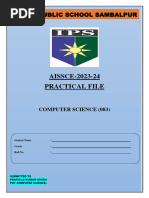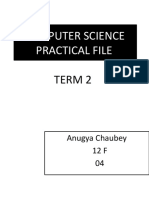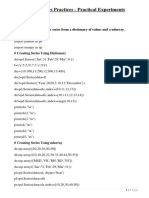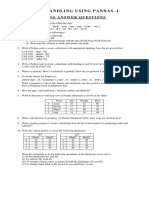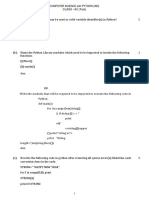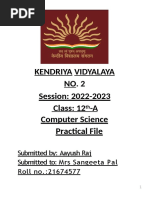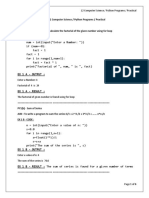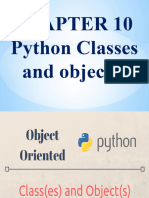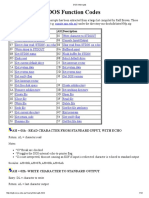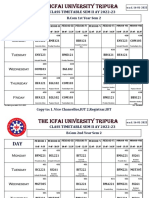+2 Computer Science: Python Programs For Practical
Uploaded by
Priya+2 Computer Science: Python Programs For Practical
Uploaded by
Priya+2 Computer Science
Python Programs for Practical
Video Lessons for
+2 Computer Science
+2 Computer Applications
+1 Computer Science
@
https://www.youtube.com/c/alphakarumpalagai
Alpha Karumpalagai +2 Computer Science Python Programs for Practical Page 1
Alpha Karumpalagai +2 Computer Science Python Programs for Practical Page 2
1
Write a program to calculate the factorial of the given number using loop
num = int(input("Enter a Number:"))
res = 1
for i in range(1,num+1):
res = res * i
print("Factorial of", num, "is", res)
Output
Enter a Number:12
Factorial of 12 is 479001600
Alpha Karumpalagai +2 Computer Science Python Programs for Practical Page 3
2
Write a program to sum sum the series
𝟏 𝟐𝟐 𝟑𝟑 𝟒𝟒 𝒏𝒏
+ + + +⋯
𝟏 𝟐 𝟑 𝟒 𝒏
n = int(input("Enter a value of n:"))
s = 0.0
for i in range(1,n+1):
a = float(i**i)/i
s=s+a
print("The sum of the series is",s)
Output
Enter a value of n:4
The sum of the series is 76.0
Alpha Karumpalagai +2 Computer Science Python Programs for Practical Page 4
3A
Write a program using functions to check whether a number is odd or even
Using if … else …
def oddeven(a):
if (a%2==0):
return 1
else:
return 0
num = int(input("Enter a number:"))
if(oddeven(num)==1):
print("The given number is Even")
else:
print("The given number is Odd")
Output
Enter a number:7
The given number is Odd
Enter a number:6
The given number is Even
Alpha Karumpalagai +2 Computer Science Python Programs for Practical Page 5
3B
Write a program using functions to check whether a number is odd or even
Using if … elif …
def oddeven(a):
if (a%2==0):
return 1
else:
return 0
num = int(input("Enter a number:"))
if(oddeven(num)==1):
print("The given number is Even")
elif(oddeven(num==0)):
print("The given number is Odd")
Output
Enter a number:7
The given number is Odd
Enter a number:6
The given number is Even
Alpha Karumpalagai +2 Computer Science Python Programs for Practical Page 6
4
Write a program to create a mirror of the given string.
For example "wel" = "lew"
def rev(str1):
str2 =''
i = len(str1)-1
while i >=0:
str2 += str1[i]
i -=1
return str2
word = input("\nEnter a String:")
print("\nThe mirror image of given string is :", rev(word))
Output
Enter a String:school
The mirror image of given string is :loohcs
Alpha Karumpalagai +2 Computer Science Python Programs for Practical Page 7
5
Write a program to generate values from 1 to 10 and then remove all the odd
numbers from the list.
num1=[]
for i in range(1,11):
num1.append(i)
print("Numbers from 1 to 10 .....\n",num1)
for j,i in enumerate(num1):
if(i%2 == 1):
del num1[j]
print("The values after removed odd numbers .....\n",num1)
Output
Numbers from 1 to 10 .....
[1, 2, 3, 4, 5, 6, 7, 8, 9, 10]
The values after removed odd numbers .....
[2, 4, 6, 8, 10]
Alpha Karumpalagai +2 Computer Science Python Programs for Practical Page 8
6
Write a program that generates a set of prime numbers and another set of
odd numbers. Display the result of union, intersection, difference and
symmetric difference operations.
odd = set([x*2+1 for x in range(0,5)])
primes = set()
for i in range(2,10):
j= 2
f=0
while j<=i/2:
if i % j == 0:
f=1
j+=1
if f == 0:
primes.add(i)
print("Odd Numbers: ", odd)
print("Prime Numbers: ", primes)
print("Union: ", odd.union(primes))
print("Intersection: ", odd.intersection(primes))
print("Difference: ", odd.difference(primes))
print("Symmetric Difference: ", odd.symmetric_difference(primes))
Alpha Karumpalagai +2 Computer Science Python Programs for Practical Page 9
Output
Odd Numbers: {1, 3, 9, 5, 7}
Prime Numbers: {2, 3, 5, 7}
Union: {1, 2, 3, 5, 7, 9}
Intersection: {3, 5, 7}
Difference: {1, 9}
Symmetric Difference: {1, 2, 9}
Alpha Karumpalagai +2 Computer Science Python Programs for Practical Page 10
7
Write a program to accept a string and print the number of uppercase,
lowercase, vowels, consonants and spaces in the given string using class.
class String:
def __init__(self):
self.uppercase = 0
self.lowercase = 0
self.vowels = 0
self.consonants = 0
self.spaces = 0
self.string = ""
def getstr(self):
self.string = input("Enter a string:")
def count_upper(self):
for ch in self.string:
if ch.isupper():
self.uppercase += 1
def count_lower(self):
for ch in self.string:
if ch.islower():
self.lowercase += 1
def count_vowels(self):
for ch in self.string:
if ch in ('A','a','E','e','I','i','O','o','U','u') :
self.vowels += 1
Alpha Karumpalagai +2 Computer Science Python Programs for Practical Page 11
def count_consonants(self):
for ch in self.string:
if ch not in ('A','a','E','e','I','i','O','o','U','u') :
self.consonants += 1
def count_space(self):
for ch in self.string:
if ch == " ":
self.spaces += 1
def execute(self):
self.count_upper()
self.count_lower()
self.count_vowels()
self.count_consonants()
self.count_space()
def display(self):
print("The given string contains ....")
print("%d Uppercase letters" %self.uppercase)
print("%d Lowercase letters" %self.lowercase)
print("%d Vowels" %self.vowels)
print("%d Consonants" %self.consonants)
print("%d Spaces" %self.spaces)
S = String()
S.getstr()
S.execute()
S.display()
Alpha Karumpalagai +2 Computer Science Python Programs for Practical Page 12
Output
Enter a string:Welcome to Computer Science
The given string contains ....
3 Uppercase letters
21 Lowercase letters
10 Vowels
17 Consonants
3 Spaces
Alpha Karumpalagai +2 Computer Science Python Programs for Practical Page 13
You might also like
- Class-12-Computer Science Practical File 2023-2475% (24)Class-12-Computer Science Practical File 2023-2445 pages
- CLASS 12 Computer Science Practical - Report Files 2023 2024100% (1)CLASS 12 Computer Science Practical - Report Files 2023 202453 pages
- Practical Implementation of Stack Using ListNo ratings yetPractical Implementation of Stack Using List6 pages
- Class 12 CSC Practical Record File 2024-25 Final50% (2)Class 12 CSC Practical Record File 2024-25 Final11 pages
- Question Bank Subject: Computer Science: Class: XII Sub. Code: 08350% (2)Question Bank Subject: Computer Science: Class: XII Sub. Code: 0835 pages
- Data File Handling Application Based Questions AnswersNo ratings yetData File Handling Application Based Questions Answers2 pages
- Class-12 File Handling Question and AnswerNo ratings yetClass-12 File Handling Question and Answer19 pages
- Data Handling Using Pandas-1: Long Answer Questions100% (1)Data Handling Using Pandas-1: Long Answer Questions1 page
- Chapter-5-File Handling, Type A, B & C NOTES100% (2)Chapter-5-File Handling, Type A, B & C NOTES28 pages
- SAMPLE PAPER-II Class XII (Computer Science) HALF YEARLYNo ratings yetSAMPLE PAPER-II Class XII (Computer Science) HALF YEARLY6 pages
- 12th Computer Science Practical User Manual 2024 2025No ratings yet12th Computer Science Practical User Manual 2024 202554 pages
- Importing & Exporting CSV Fileppt For Class 12, Presentation With ExamplesNo ratings yetImporting & Exporting CSV Fileppt For Class 12, Presentation With Examples12 pages
- CBSE Class 12 Computer Science - Communication and Network Concepts PDF67% (3)CBSE Class 12 Computer Science - Communication and Network Concepts PDF16 pages
- Vaibhav Sharma 12-A Roll No. 34assignment - 3 Binary FileNo ratings yetVaibhav Sharma 12-A Roll No. 34assignment - 3 Binary File12 pages
- Project File of Python Programs: AcknowledgementNo ratings yetProject File of Python Programs: Acknowledgement5 pages
- Kendriya Vidyalaya NO. 2 Session: 2022-2023 Class: 12 - A Computer Science Practical FileNo ratings yetKendriya Vidyalaya NO. 2 Session: 2022-2023 Class: 12 - A Computer Science Practical File24 pages
- Program-1: Given A Stack Named Book - Details That Contains Book - No, Book - Name and100% (4)Program-1: Given A Stack Named Book - Details That Contains Book - No, Book - Name and3 pages
- My SQL Worksheet-3 (Aggregate Functions)No ratings yetMy SQL Worksheet-3 (Aggregate Functions)7 pages
- Class 12 - COMPUTER NETWORKS - Important Case Questions0% (1)Class 12 - COMPUTER NETWORKS - Important Case Questions10 pages
- Important Questions For Class 12 Computer Science (Python) - Review of Python100% (1)Important Questions For Class 12 Computer Science (Python) - Review of Python31 pages
- Computer Science Project Report: (PYTHON AND MYSQL Connectivity) Bank Management SystemNo ratings yetComputer Science Project Report: (PYTHON AND MYSQL Connectivity) Bank Management System22 pages
- 9 Practical Question Paper AI Annual ExamNo ratings yet9 Practical Question Paper AI Annual Exam2 pages
- Compact 5000 I/O Serial Module: User ManualNo ratings yetCompact 5000 I/O Serial Module: User Manual156 pages
- A Morpheme Is The Smallest Grammatical Unit in A LanguageNo ratings yetA Morpheme Is The Smallest Grammatical Unit in A Language2 pages
- 04 Nishat Zaidi 2021 - Detective Fiction in Urdu - Form, Function, GenealogyNo ratings yet04 Nishat Zaidi 2021 - Detective Fiction in Urdu - Form, Function, Genealogy4 pages
- Hotspot Captive Portal Landing Page Not Pop Up in Ios Devices - MikroTikNo ratings yetHotspot Captive Portal Landing Page Not Pop Up in Ios Devices - MikroTik7 pages
- Bba (Gen) Business Mathematics (Bba Gen 102)No ratings yetBba (Gen) Business Mathematics (Bba Gen 102)4 pages
- Making Progress To First Certificate PDFNo ratings yetMaking Progress To First Certificate PDF2 pages
- Anti-Hodder - Velandia César English VersionNo ratings yetAnti-Hodder - Velandia César English Version18 pages
- 0103 Introduction To Media and Information Literacy SW2No ratings yet0103 Introduction To Media and Information Literacy SW25 pages
- 5fa9547986fd360027cb85f9 1635128249 1. Introduction To The 21st Century LiteraciesNo ratings yet5fa9547986fd360027cb85f9 1635128249 1. Introduction To The 21st Century Literacies9 pages
